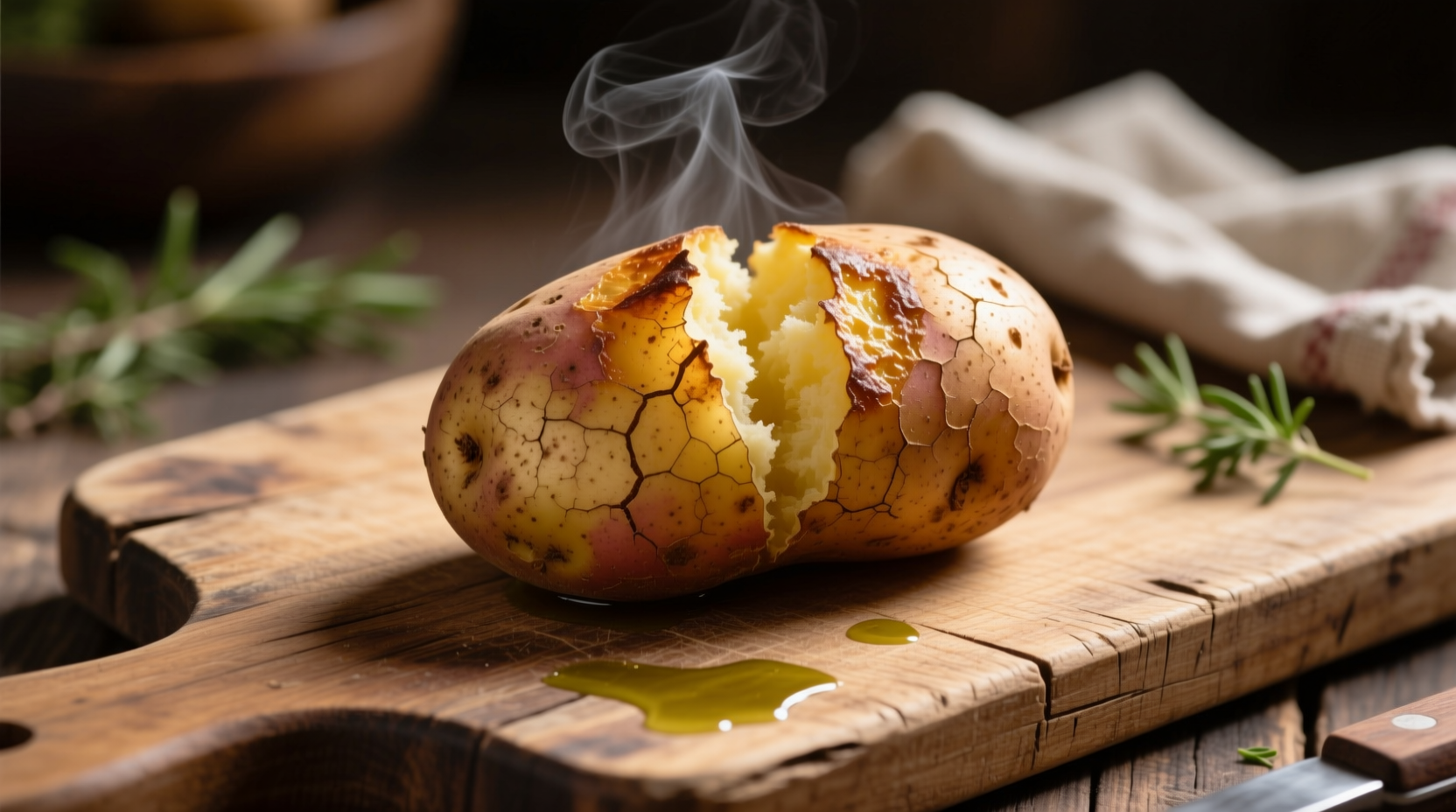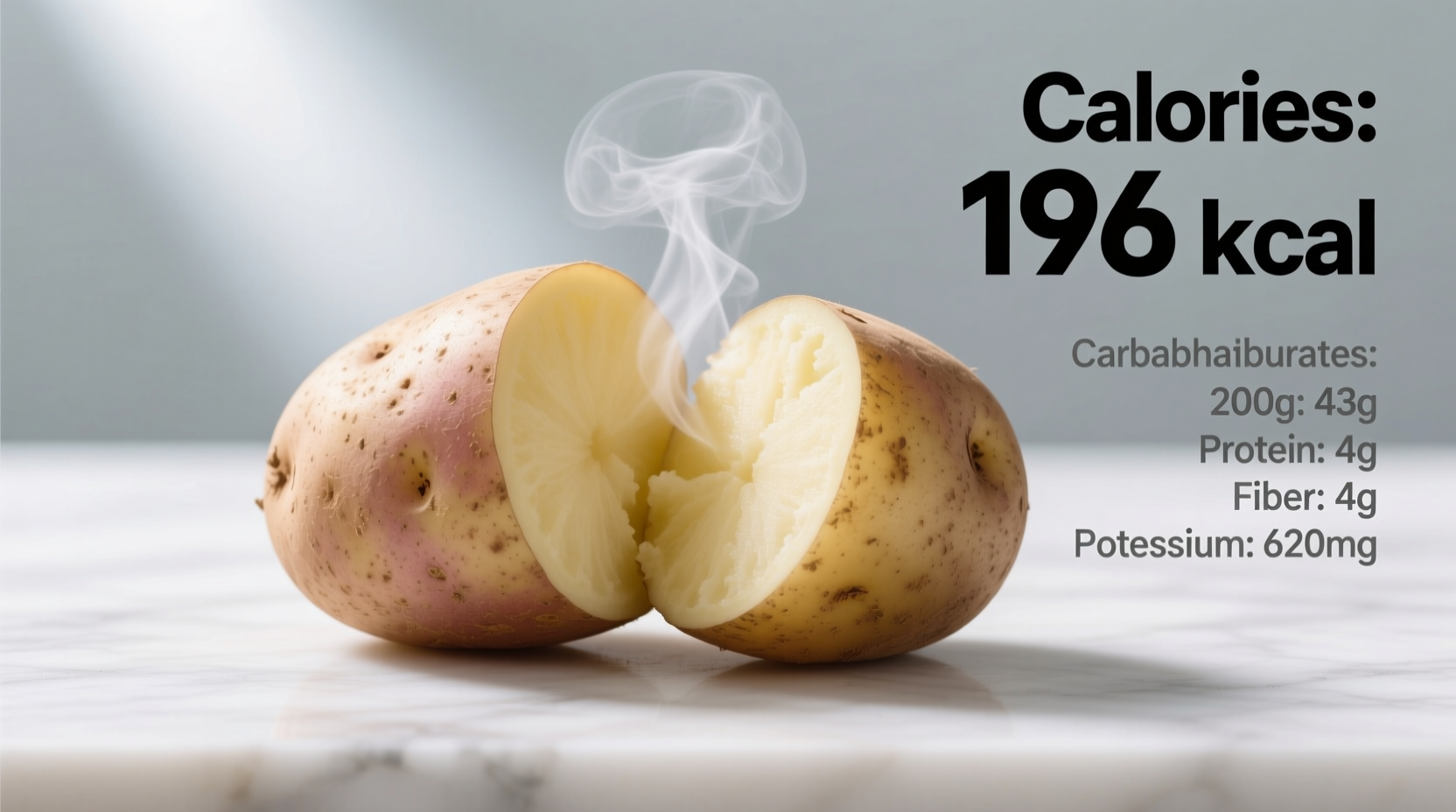Understanding the exact calorie count in a russet potato helps you make informed dietary choices whether you're managing weight, tracking macros, or planning balanced meals. Let's explore the complete nutritional profile and practical applications of this versatile staple.
Quick Reference: Russet Potato Calorie Facts
Before diving deeper, here's what you need to know immediately about russet potato calories:
- A medium russet potato (5.3 oz / 150g) has 168 calories
- Most calories come from complex carbohydrates (37g)
- Contains 4.6g of filling fiber (18% of daily value)
- Naturally fat-free and cholesterol-free
- Rich in potassium, vitamin C, and vitamin B6
Complete Nutritional Breakdown
The calorie count in russet potatoes varies based on size and preparation method. The USDA FoodData Central provides the most authoritative nutrition information for raw and cooked potatoes.
| Portion Size | Calories | Carbohydrates | Fiber | Protein |
|---|---|---|---|---|
| Small (2" diameter, 138g) | 152 | 34g | 3.2g | 3.6g |
| Medium (3" diameter, 173g) | 168 | 37g | 4.6g | 4.3g |
| Large (3.5" diameter, 299g) | 290 | 65g | 7.4g | 7.5g |
| 1 cup diced (150g) | 134 | 31g | 3.6g | 3.6g |
Source: USDA FoodData Central, Food Composition Database, ID 11014
How Preparation Affects Calorie Count
The cooking method significantly impacts the final calorie content of your russet potato. While the potato itself remains relatively consistent in nutritional value, added ingredients can dramatically change the profile.

Consider these common preparation scenarios:
- Baked with skin: Maintains the natural 168 calories for a medium potato
- Boiled: Similar calorie count but may lose some water-soluble nutrients
- Mashed with butter and milk: Can add 50-100+ calories depending on portions
- Fried as french fries: Increases calories to approximately 365 for a medium serving
- Baked potato with toppings: Sour cream (60 cal/oz), cheese (110 cal/oz), and bacon (45 cal/oz) add significant calories
Nutritional Benefits Beyond Calories
Russet potatoes offer impressive nutritional value that extends far beyond their calorie count. One medium potato provides:
- 28% of your daily potassium needs (more than a banana)
- 30% of vitamin C requirements
- 10% of vitamin B6
- Significant amounts of magnesium and iron
- Naturally gluten-free and suitable for multiple dietary patterns
The fiber content in russet potatoes (particularly when eaten with skin) supports digestive health and helps maintain stable blood sugar levels compared to refined carbohydrates. This makes them a better choice than many processed starches for sustained energy.
Practical Applications for Your Diet
Understanding how to incorporate russet potatoes into your meal plan can help you enjoy their benefits while managing calorie intake:
For Weight Management
Russet potatoes have a high satiety index, meaning they help you feel full longer. A study published in the European Journal of Clinical Nutrition found boiled potatoes ranked highest for satiety among 38 common foods. Enjoy them baked with minimal toppings to maximize this benefit while keeping calories in check.
For Active Lifestyles
The complex carbohydrates in russet potatoes provide sustained energy release, making them excellent pre-workout fuel. Athletes often include them in their meal plans for their carbohydrate content and potassium, which helps prevent muscle cramps.
Healthy Preparation Tips
- Always bake with skin to retain nutrients and fiber
- Use Greek yogurt instead of sour cream for topping (saves 30+ calories per ounce)
- Add herbs and spices for flavor without extra calories
- Cool cooked potatoes to increase resistant starch content
- Avoid deep-frying to maintain the naturally low-fat profile
Common Misconceptions About Potato Nutrition
Over the years, potatoes have faced unnecessary criticism in some diet circles. Research from the Harvard T.H. Chan School of Public Health clarifies that potatoes themselves aren't problematic—it's how we typically prepare and consume them.
Their 2020 analysis of multiple studies concluded that moderate potato consumption (1-3 servings weekly) as part of a balanced diet doesn't negatively impact weight management or blood sugar control for most people. The key is preparation method and portion control.
Comparing Russet Potatoes to Other Varieties
While all potatoes share similar nutritional profiles, there are slight differences between varieties:
- Russet: Higher in starch, ideal for baking and frying, slightly higher in calories per serving
- Yukon Gold: Creamier texture, slightly lower in calories, excellent for mashing
- Red potatoes: Waxy texture, lower glycemic index, similar calorie count
- Sweet potatoes: Higher in vitamin A, slightly lower glycemic index, comparable calories
For most culinary applications and nutritional needs, the differences are minimal. Choose based on your recipe requirements rather than small nutritional variations.
How Potato Nutrition Understanding Has Evolved
Nutrition science regarding potatoes has significantly advanced over the past two decades:
- Early 2000s: Potatoes were often grouped with refined carbohydrates in dietary guidelines
- 2010-2015: Research began distinguishing between whole food carbohydrates and processed ones
- 2016-2020: Studies highlighted the importance of preparation method on nutritional impact
- Current understanding: Potatoes recognized as nutrient-dense whole foods when prepared healthily
This evolution reflects a broader shift in nutrition science toward evaluating whole foods in context rather than isolating single nutrients.
Practical Tips for Accurate Calorie Tracking
When tracking calories from russet potatoes:
- Weigh potatoes before cooking for most accurate measurement
- Remember that cooking methods like baking concentrate nutrients as water evaporates
- Account for all toppings and additions in your tracking
- Consider using a food scale rather than visual estimation
- Track the entire potato including skin for complete nutritional picture
Conclusion
A medium russet potato provides approximately 168 calories along with valuable nutrients that support overall health. By understanding how preparation methods affect the final nutritional profile, you can enjoy this versatile food as part of a balanced diet whether you're managing weight, fueling athletic performance, or simply eating well.
The key is focusing on healthy preparation methods that preserve the potato's natural nutritional benefits while avoiding excessive added fats and calories. When enjoyed as part of a varied diet, russet potatoes offer both culinary versatility and meaningful nutritional value.











 浙公网安备
33010002000092号
浙公网安备
33010002000092号 浙B2-20120091-4
浙B2-20120091-4